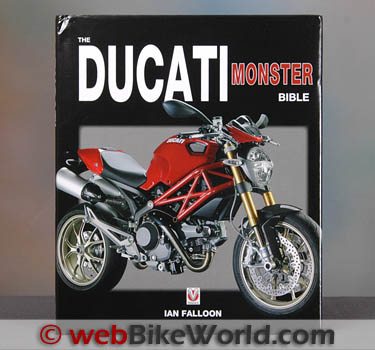Ducati Monster Bible wBW Book Review
The Ducati Monster Bible
by: Ian Falloon
Hardcover
ISBN: 978-1-845843-21-2
Publisher: Veloce Publishing, Ltd.
Publication Date: July 2011
160 Pages. 25.5 x 21.5 x 2 cm
List Price: $59.95 USD; £30 GBP
The Ducati Monster first seeped into my consciousness back around 2001 or so.
It was during a visit to Speed’s Cycle near Baltimore, Maryland.
I previously hadn’t thought much about Ducati one way or the other.
I admired and respected the brand, of course.
But the bikes seemed a bit too…strange-looking for me, if you can believe it.
But that day, sitting on Speed’s showroom floor was a Monster M900 “Cromo”, a limited-edition version with a standard chrome fuel tank.
It was one of those jaw-dropping moments that happen whenever you come upon a new (or in this case, used!) motorcycle that twangs all the heart strings.
The Cupid of motorcycle love has struck again!
So you may think this is the start of a “man meets Monster; man buys Monster” story and both lived happily ever after. Nope!
For one reason or another, I didn’t buy that Monster, even after going back and forth to Speed’s about a dozen times, leaving a bit more drool on that chrome tank each time (yuck!).
But something about that bike haunted me — the in-your-face fuel tank was, of course part of the attraction.
But also the…I guess I’d call it the “agriculturally brutish” look it possessed. It was something new to me.
I had walked into the shop not knowing a Monster from a Deauville and 30 seconds later I needed to know all I could about that Ducati Monster.
Funny how that goes…
Which brings me to Ian Falloon’s new book, The Ducati Monster Bible published by Veloce in the UK.
I’m usually a “newer is better” kind of guy, so you’d think the latest Monster would be my cup of tea.
But I must admit that I am smitten with the looks of those early Monsters, and I think the original, early editions look best.
One thing’s for sure: a Monster of any generation is absolutely the textbook definition (if there is one) of “modern classic”, no two ways about it.
A classic is a bike that starts out looking great and still looks that way years — or even decades — later.
Proving that the Monster is indeed worthy of that title can be found on the book’s third page, in a chapter about the very earliest version.
On that page, there is a photo a beautiful-looking red M900, one of the very first made. I looked at the photo and immediately thought something was wrong. That bike absolutely does not look like anything else from 1993.
But a ’93 it is — a red 1993 M900, one of the first Monsters off the production line.
It still looks fantastic and it could easily compete with anything on the showroom floor in 2011. Or 2012, for that matter.
And I have to say, the original Monsters are meaner, leaner and cooler looking than latest iteration, which appears to me to be a bit like a smiley-face Dove bar eating, Starbucks-drinking iPhone version of the original Monstah.
But all told, it’s pretty hard to pick a nit with any Monster from any year.
And that’s why the bike has become Ducati’s number one seller.
Anyway, the point of all this is to show just what a great-looking (and in this case, instant classic) bike can do to you.
It put Ducati on my radar screen and even though it may seem ironic that I still don’t own one, it doesn’t mean I don’t have lust in my heart.
So I’m bringing you a different perspective in reviewing this book. Because if the book is interesting to me, a non-owner, then it should be like candy to the true Ducati aficionado.
A book entitled “The Ducati Monster Bible” could go a couple of ways. It could be a dry, boring recitation of facts, figures and running model changes.
Or it could be an interesting narrative background on the development and evolution of this cool ride. But, it could also be a bit of both.
I think it’s the latter and in this case — probably a good thing. For Monster newbies, the model development history at the beginning of the book is narrative and it’s very interesting and well-told.
The book is then organized by chapters, each of which describes a different model year.
Some of the models get only short entries with a bit of detail on changes from the original, along with some paint codes. These can be a bit dry to the casual areader.
Other, more significant models, get a nicely condensed background and more narrative, although I will say that the focus is usually on the technical aspects and specification differences of each.
So even though I’m not into Monsters enough to want to know, say, that the paint code for a Monster 100 model in 2005 was “Shining Black PPG 248.514″…
The book includes good background for the 2005 model year in general and notations of various changes, improvements and deletions — important stuff to know as you’re hunting for that used example. And don’t forget — there are plenty of nice color photos.
Ian Falloon is the Master at this, having written at least 20 motorcycle books, 10 of which are about Ducati.
His name is one of the most recognized in motorcycle journalism anywhere in the world, so he needs no introduction.
He had insider access to Ducati, including drawings, model year specifics and some fantastic photos, all of which should turn even a Gold Wing owner into a Monster driver!
One thing is missing though: don’t look for frame and engine numbers.
I’d like to see that information included; it’s especially important for historical purposes and for future Monster owners.
Surely this bike will be around for a long, long time, so getting that information recorded now will be much easier than trying to get it, oh, 30 years from now.
I hope it will be added in near-future editions of The Ducati Monster Bible, because that would truly make it a “Bible” worthy of the name.
By the way, the book has just been released.
Conclusion
You don’t have to be a Ducati lover — or even know much about the brand — to like the combination of development history and hard specifications on what is and will be one of the most iconic motorcycles ever made.
The book includes Monster history right up to the current 2011 model year.
So you’ll get a full dose of Monster madness from its beginnings in the early 1990’s until now. If reading this book and looking at the photos doesn’t make you want to buy one, check your pulse!
Review Date: August 2011

Where to Buy Ducati Monster Bible Book
Check Reviews & Prices on AmazonSee More: Motorcycle Books
Owner Comments and Feedback
See details on submitting comments.


![Ian Falloon'sThe Ducati Monster Bible [Hardcover]2011 Ian Falloon'sThe Ducati Monster Bible [Hardcover]2011](https://m.media-amazon.com/images/I/5160JDbrrqL._SL160_.jpg)

No Comment